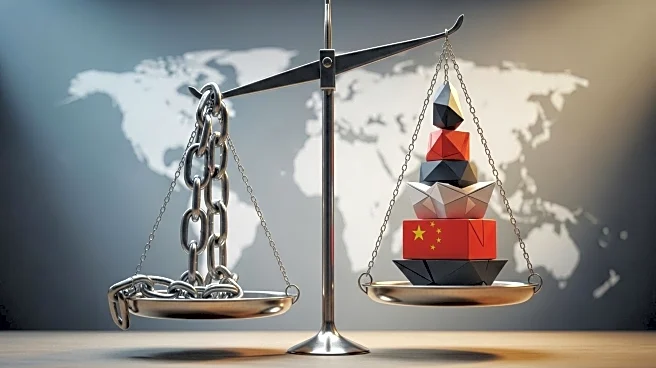What's Happening?
President Trump has threatened to impose tariffs of 100% on all Chinese goods, escalating tensions in the ongoing trade conflict between the United States and China. This move comes after China expanded export restrictions on critical raw materials, which are essential for manufacturing technologies such as computer chips and defense equipment. In response, China has vowed to retaliate if the tariffs are implemented, with the Foreign Ministry stating that it will take measures to protect its rights and interests. The trade conflict has already impacted China's exports to the U.S., which fell by 27% in September compared to the previous year. Despite this, China's overall export numbers have shown growth, partly due to increased shipments to countries like Vietnam.
Why It's Important?
The imposition of 100% tariffs on Chinese goods by the U.S. could have significant implications for global trade and economic stability. U.S. consumers and businesses may face higher prices, contributing to inflationary pressures. The tariffs could disrupt supply chains, particularly in industries reliant on Chinese raw materials and components. Additionally, the escalation in trade tensions may affect diplomatic relations between the two countries, potentially impacting future negotiations and agreements. The broader economic impact could extend to other countries involved in global trade networks, as they navigate the consequences of increased tariffs and export restrictions.
What's Next?
The situation remains fluid, with potential developments hinging on upcoming diplomatic engagements. President Trump has indicated that the tariffs could be imposed as early as November 1, depending on China's actions. A planned meeting between Trump and Chinese leader Xi Jinping at the Asia-Pacific Economic Cooperation forum may provide an opportunity for dialogue and de-escalation. However, there is a risk that both sides may entrench their positions, leading to prolonged trade tensions. Stakeholders, including businesses and policymakers, will be closely monitoring the situation for any signs of resolution or further conflict.
Beyond the Headlines
The trade conflict highlights the complexities of international trade relations and the challenges of balancing economic interests with geopolitical strategies. The use of tariffs and export controls as tools of economic policy raises questions about their effectiveness and long-term impact on global trade systems. Additionally, the reliance on critical raw materials from China underscores the need for diversification in supply chains to mitigate risks associated with geopolitical tensions.











